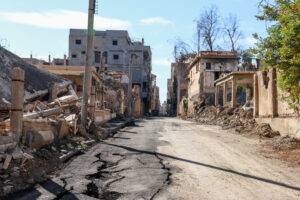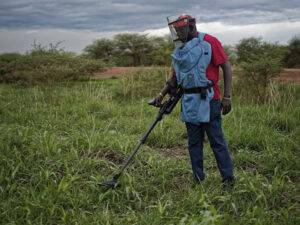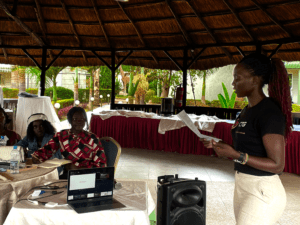Why Peace Needs Partners: Peacebuilding and SDG 16 in Post-Conflict Countries
At the outset of 2025, the prospects for meeting the 2030 Agenda for Sustainable Development and achieving the 17 Sustainable Development Goals (SDGs) look grim. One of the key challenges is growing and recurring conflict, which undermines progress on all development goals. SDG 16 – Peace, justice and strong institutions – is a pivotal goal that, if met, can help countries break out of the vicious cycle of conflict and enable progress in all areas of the 2030 Agenda.
With staff on the ground in many conflict-affected or post-conflict countries, CTG is deeply invested in SDG 16 and using its resources to promote peace, justice and strong institutions. In this blog, we look at what it means to build sustainable peace after a conflict, and how private sector organisations can assist in peacebuilding efforts.
What is peacebuilding?
Conflicts have doubled over the last five years, showing an increase in battle-related deaths, violence and forced displacement. Some countries, such as Sudan and Myanmar, are in the throes of extended civil wars. Others, like Ukraine and the Democratic Republic of Congo, are fighting invaders and outside forces.
Still others, such as Gaza and Syria, have recently entered a post-conflict state, where ceasefires or regime changes have stopped the immediate, ongoing violence. All of these countries or regions are looking toward a day when conflict gives way to a lasting peace. But, to achieve lasting peace, societies need to slowly and painstakingly build the right conditions to prevent conflict from breaking out again.

Over 140,000 buildings were destroyed in Syria during the civil war. With the fall of the Assad regime in December 2024, Syria moving into a post-conflict state.
Peacebuilding comes after peacemaking (reaching a peace agreement) and overlaps with peacekeeping (enforcing the terms of a peace agreement). It’s the process of addressing the root causes of a conflict to prevent further or future conflict and involves developing the new regime or state’s ability to govern. As SDG 16 suggests, peace requires strong institutions that are able to resolve current and future clashes peacefully.
However, setting up strong institutions after a conflict is an incredibly difficult and drawn-out process. Although post-conflict countries can attempt peacebuilding on their own, research shows that peacebuilding is rarely effective without some form of external assistance. When neutral partners – such as humanitarian agencies or private sector companies – support and enable local efforts, it can make the difference between lasting peace and a return to conflict.
The building blocks of peace
Each post-conflict state will have unique needs, but research from the German Development Institute indicates five general areas where collaboration between external bodies and local stakeholders can help build a lasting peace.
1. Peacekeeping
This is the deployment of military troops that focus on enforcing peace agreements. By preventing violence and defending civilians, peacekeeping forces can help create space for recovery and rebuilding.
2. Nonmilitary security
One of the most important outcomes of peacebuilding is establishing the legitimacy of the new regime or state, especially in terms of its monopoly on violence. That means violence must be demilitarised and only used by the state to enforce the law.
Private security companies (PSCs) often play an important role in providing initial nonmilitary security. As neutral parties, they can help the state reform and democratise its police, assist in demilitarising conflict zones and guard vital infrastructure and services.

Nonmilitary security is also often contracted for demining and demilitarisation programmes.
3. Politics and governance
A post-conflict state needs to create opportunities for meaningful and peaceful political engagement. Citizens must have access to functioning public institutions to settle disputes and grievances without violence.
External assistance for politics and governance often takes the form of international election monitoring, which can help build trust in the outcome of an election, and building government capacity to handle disputes fairly.
4. Socioeconomic development
After a conflict, social and economic institutions also need to be rebuilt alongside infrastructure and basic services. Improved living conditions and economic opportunities give citizens a stake in peace, which can help ease grievances and make a return to violence less likely. External private sector organisations can provide crucial jobs and help boost a post-conflict economy.
5. Societal conflict transformation
Mending the social fabric of post-conflict society requires accountability for atrocities and a sense of justice being done. Reconciliatory processes, such as truth commissions, independent investigations and mediation, can bring closure to those affected by the conflict and help rebuild relationships after violence.
Building peace, justice and strong institutions in Liberia
Multidimensional peacebuilding that accounts for each of the five areas has proven to be the most effective solution for post-conflict societies. For example, after the Second Liberian Civil War, the combination of UN peacekeeping and international support for democratic development, direct humanitarian assistance, and economic development helped stabilise the war-torn country.
The provision of social infrastructure in the form of roads, schools, hospitals, utilities, and social services, in combination with political reform and elections supported by peacekeeping troops and private security, allowed Liberians to build strong institutions and claim a stake in their peace. In 2023, Liberia celebrated 20 years of peace and stability.

While Liberia still faces challenges, 2017 saw its first successful democratic elections pass peacefully.
Building lasting peace beyond external support
The role of women in peace and security
The strongest predictor of peacebuilding’s success is women’s involvement in the process. Nearly 100 studies come to the same conclusion: when women are involved, the likelihood of peace lasting 15 years increases by 35%. Despite this, women are routinely excluded from peace agreements and peacebuilding decision-making.
Liberia is, again, an example of how women’s involvement made a difference. Although there were no women negotiators, mediators or signatories to the Accra Agreement, women played a strong role in peacemaking through mass staged action, holding negotiators to account, building public support and aiding disarmament.
But this outcome is not often the case. During conflict, women suffer disproportionately. After conflict, societies often force women back into subordinate traditional roles and exclude them from decision-making. For example, after the 1998-1999 Kosovo War, one Kosovar woman working for the United Nations Mission there expressed her frustration with the situation:
It is really amazing that the international community only cared about Kosovar women when they were being raped – and then only as some sort of exciting story. […] when it comes to real involvement in the planning for the future of this country, our men tell the foreign men to ignore our ideas. And they are happy to do so – under the notion of ‘cultural sensitivity’. Why is it politically incorrect to ignore the concerns of Serbs or other minorities, but ‘culturally sensitive’ to ignore the concerns of women?
This reality is evident in many cases of post-conflict peacebuilding. For example, of the 1,860 peace agreements signed between 1990 and 2019, only 6% contained provisions that address violence against women.
In 2022, women represented only 16% of negotiators in peace processes. If women are not included in peace agreements and peacebuilding, challenges like gender-based violence, gender inequality and renewed conflict are unlikely to be addressed and resolved sustainably.
Businesses, NGOs, international organisations and governments can support women’s participation in peacebuilding by providing decision-making opportunities and setting standards for inclusive and equal communities.
Private sector support in peacebulding
International or external private sector organisations can support post-conflict countries by delivering services, building infrastructure, creating jobs, and providing private security and/or external oversight. However, external assistance can come with risks, such as exploitation, creating reliance on external aid and undermining local ownership of peacebuilding processes.
The key consideration for business who operate in fragile, post-conflict societies must be how they will work with local stakeholders to build strong institutions that can promote sustainable peace. Private businesses have the resources and influence to promote sustainable development and social innovation – including greater gender equality, grass-roots initiatives and collaborative governance – that can contribute to a more resilient post-conflict society.
Making a commitment to peaceful futures
Private sector companies like CTG, in partnership with humanitarian agencies and intergovernmental bodies, can play an important role in providing support in critical areas of peacebuilding.

Private companies can support post-conflict countries in various ways. Here, participants are engaging in a Female First Job-readiness workshop in South Sudan, where a tenuous ceasefire is in place.
They are perfectly positioned as neutral parties that can use their resources to make social innovation, from sustainability to gender equality, part of the fabric of the communities they serve. Through partnerships and collaboration, we can help build communities that are more resilient to disruption and perpetual cycles of conflict.
CTG recently became a signatory to the Women, Peace and Security and Humanitarian (WPS-HA) Action Compact, reaffirming its commitment to SDG 5 and 16, and building a more inclusive and peaceful world. We will continue to lead by example and support the communities we serve to develop sustainable peace, justice and strong institutions.
